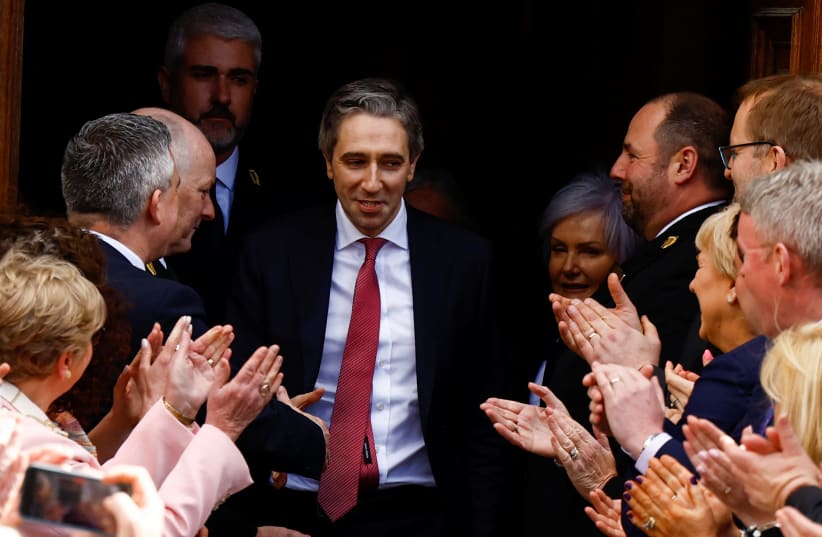Simon Harris, who became the youngest-ever Prime Minister of Ireland on Tuesday after the sudden resignation of his predecessor, Leo Varadkar, affirmed on Saturday his willingness to recognize a Palestinian state, condemned Hamas, and called for the release of hostages. Harris also, however, condemned Israel’s conduct in its war against the jihadist group.
Harris addressed the war between Israel and Hamas and its allies during a speech on Saturday at the annual conference of his party, Fine Gael.
"We absolutely, fully condemn the massacre carried out by Hamas in October," Harris said, "and again, we call for the unconditional release of all of the hostages. But—" Harris said, pausing for applause, "we will not stay silent on the actions of the Israeli government either," a line that drew a second round of applause.
Harris said that in Gaza, "reason has been replaced by revenge, by bombing, by maiming, and by the death of children." He also invoked "famine, a specter no Irish person can bear," adding that "anyone who can countenance deliberate starvation has lost their sense of humanity."
Israel denies that it is intentionally creating the conditions for famine in Gaza and recently opened a second land crossing for the movement of humanitarian aid into the Strip. The move came under pressure from the United States following an IDF strike that killed seven workers from the World Central Kitchen aid organization last week.
In his speech, Harris addressed Israeli Prime Minister Benjamin Netanyahu directly. Harris received the only standing ovation of the speech when he said, "The Irish people could not be clearer: We are repulsed by your actions. Ceasefire now, and let the aid flow safely."
Finally, he affirmed his party's support for "a two-state solution, with Israel and Palestine living side by side in peace and security." The now-prime minister reiterated that "Ireland stands ready to recognize the state of Palestine," adding, "and we know what we're talking about in this country. This island has one of the most successful peace processes on Earth." At this point, Harris transitioned to a discussion of Brexit and its consequences for UK-Irish relations.
Israeli ambassador was not invited to the speech
Israel's ambassador to Ireland, Dana Erlich, was absent from the audience for Harris’s speech on Saturday, according to the Irish Independent. The newspaper noted that Fine Gael "would be normal for Fine Gael to invite a selection of ambassadors to their [conference], especially if they are central to current global events."
The address lasted about thirty minutes and mostly focused on domestic issues, such as housing, farming, health care, and crime. Harris did, however, address the war in Ukraine, affirming his party’s support for the country in its fight to fight off a Russian invasion that began in February 2022. “Ireland, as a proud and committed member of the European Union, will always stand with the people of Ukraine,” he said.
Ireland is one of the most pro-Palestinian nations in the West, with many of its citizens interpreting Israel’s conflict with the Palestinians as containing parallels to the bloody conflict between Great Britain and Ireland; that conflict saw major acts of terrorism and violence between sectarian groups as recently as the 1990s, until the Good Friday Agreement, brokered in 1998, ended most of the bloodshed. Ireland was the first EU member to call for Palestinian statehood, which it did in 1980, and the last to allow Israel an embassy, which it did in 1993.
In March, Ireland announced it would get involved in South Africa’s case against Israel at the International Court of Justice alleging a genocide against Palestinians in Gaza. Micheál Martin, the Irish Foreign Minister, said the government would argue that blocking humanitarian aid may constitute genocidal intent.
“What we witnessed on October 7 in Israel, and what we are currently seeing in Gaza, constitutes a blatant violation of international humanitarian law on a massive scale,” Martin said at the time.

